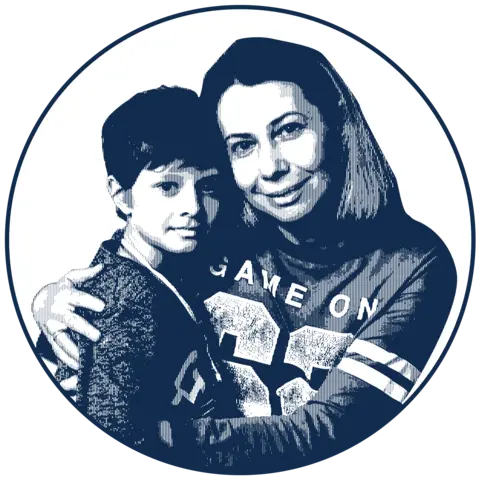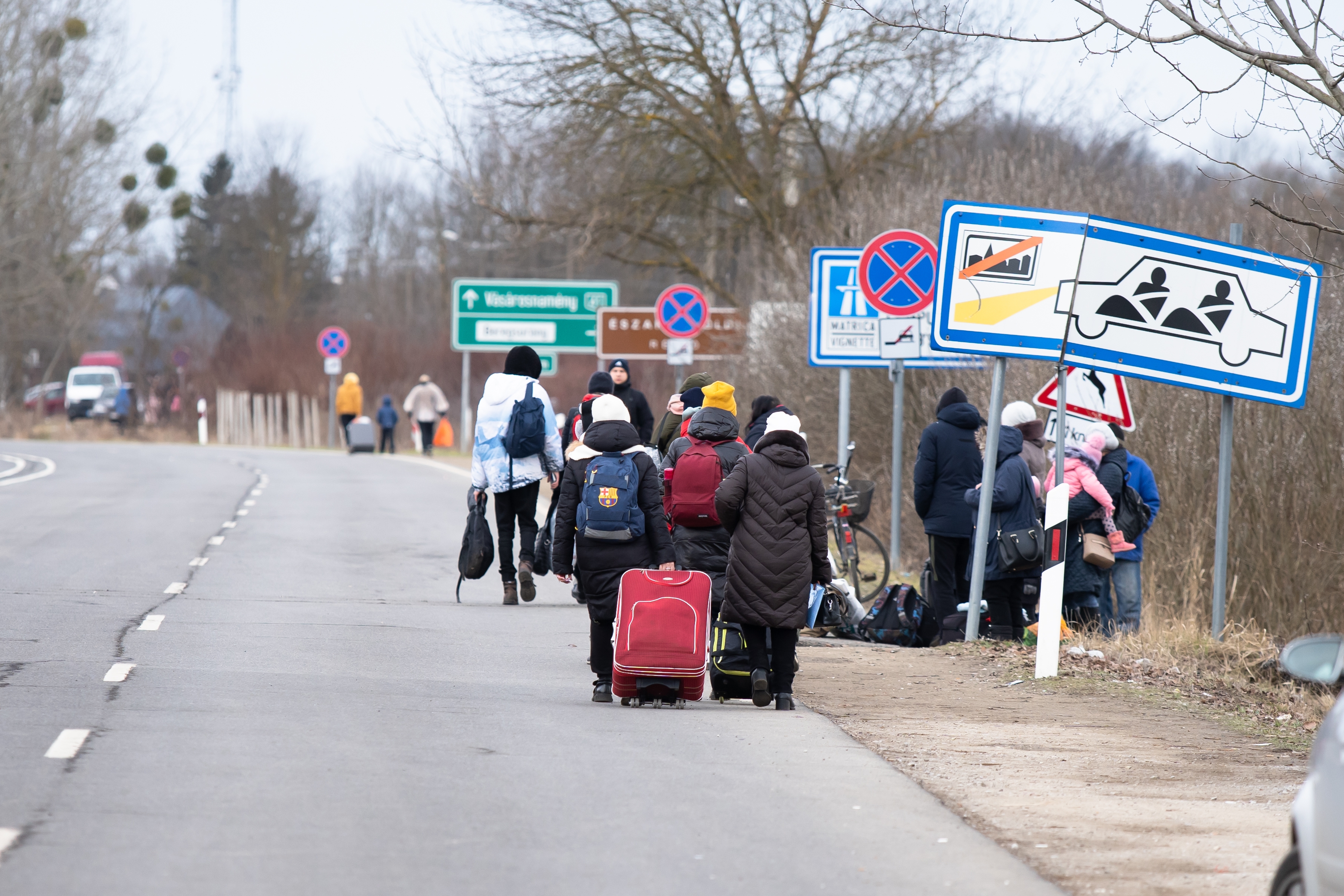Warning: This story contains graphic images that may upset some readers.
Some of the starkest images of Russian brutality in Ukraine emerged from the Kyiv suburb of Bucha last year. Ukrainian officials say 1,700 people were killed and 9,000 war crimes were committed there. With the support of the Pulitzer Center, special correspondent Simon Ostrovsky and videographer Yegor Troyanovsky returned to Bucha to tell the story of a group of Ukrainians executed in cold blood.

As a nonprofit journalism organization, we depend on your support to fund coverage of global conflicts. Help us continue funding the hard costs of in-depth coverage of the Ukraine invasion—including travel, hostile environment safety training, and the increased security expenses that arise from reporting in war zones.
Read the Full Transcript
Geoff Bennett: Some of the first and starkest images of Russian brutality in Ukraine emerged from the Kyiv suburb of Bucha last year; 1,700 Ukrainians were killed there, according to Ukrainian officials, who also say 9,000 war crimes were committed in that city.
Now, one year later and with the support of the Pulitzer Center, special correspondent Simon Ostrovsky and videographer Yegor Troyanovsky return to Bucha to reveal the story of the final hours of one group of Ukrainians executed in cold blood.
A warning: Many of the images in this story are disturbing.
Simon Ostrovsky: They call it the first draft of history. Reporters arrive on the scene to witness events while they are still fresh.
A year ago, our "NewsHour" crew found this kill site located behind an office building that had been used by Russian forces as a headquarters during their month-long occupation of Bucha.
What we have seen here is eight bodies, some of them with their hands tied behind their backs. This could be evidence of war crimes.
Our images were among some of the early footage that poured out of Bucha and opened the world's eyes to the brutality of Russia's faltering war machine. The Russian leadership claimed the pictures were staged as part of a crude attempt to tarnish Russia's reputation.
Vladimir Putin, Russian President (through translator): As for Bucha, listen, I speak with my colleagues. They have relevant intercepts about the transport that was used to get to this town and create the conditions for the organization of this provocation, this fake.
Simon Ostrovsky: On the ground, evidence pointed to executions. Many of the victims had their hands tied behind their backs, a good indication that a war crime had been perpetrated.
The victims appeared to have been killed with gunshots to the head and chest. But who were they, and who killed them? We could only speculate that retreating Russian forces were to blame because of the litter they left behind, clearly marked as being from Russia.
Several subsequent investigations conducted by PBS "Frontline," The New York Times and the BBC, piecing together CCTV footage of the last moments of these men's lives, have since established the facts and paint a grim picture of Bucha under Russian occupation.
When Russian forces first arrived in Bucha in late February, they didn't expect to stay long. This was supposed to be just another town on the way to the capital, Kyiv. Instead, their armored columns were incinerated from the sky.
Man (through translator): Come to us with a sword, die by the sword.
Simon Ostrovsky: The surviving Russians pulled back and regrouped, reentering Bucha on March 3 and 4, as confirmed by surveillance footage captured from Yuri Naumenko's auto shop.
Yuri Naumenko, Bucha Resident (through translator): There is a bullet hole there. They took it down. And that's what's left of one of the cameras. One pointed this way, and the other one was set in the opposite direction.
Simon Ostrovsky: Ukraine's top prosecutor, Andriy Kostin, told "NewsHour" what the Russians did next.
Andriy Kostin, Prosecutor General of Ukraine: On 4th of March, 2022, members of the armed forces and other military formations of Russian Federation searched the residential buildings on Yablunska Street.
So they wanted to identify the servicemen of Ukrainian army and territorial defense.
Simon Ostrovsky: As Russian troops poured into Yablunska Street to take over the neighborhood, they went door to door, rounding up civilians and men they suspected to be fighters. The Chmut family had front-row seats.
So you saw everything happening right out of this window here?
Tetiana Chmut, Bucha Resident (through translator): Yes.
Simon Ostrovsky: They watched as the ill-fated group of men were lined up in the courtyard.
Man (through translator): The bastards. The hostages are all there. There they are, sitting under the fence, one, two, three, four, five, six.
Simon Ostrovsky: The auto shop cameras had an even better view of the group of nine men being led single file, barefoot, and with their T-shirts pulled over their heads.
Eventually, the Russians came for the Chmut family. Tetiana and her sons were made to join a group of women, children and men who were not under suspicion. Her husband, Serhiy, was put in line with the group of men who had been forced to their knees.
Serhiy Chmut, Bucha Resident (through translator): Somewhere here. Somewhere here, they lined us up, right about here.
Simon Ostrovsky: One man already lay on the ground dead when Serhiy arrived.
Serhiy Chmut (through translator): There was one. He was to my right. The only thing I could think about was that my family weren't harmed.
Simon Ostrovsky: Serhiy was a hair's breadth away from being lumped in with the suspected Ukrainian fighters. But his wife and children stepped in.
Tetiana Chmut (through translator): We begged and pleaded, said: "He's a fisherman, not even a hunter. He had never served, doesn't know how to hold a pistol or a rifle."
They said: "OK, move him over with the other men."
Simon Ostrovsky: The rest were not so lucky. According to witness accounts, the remaining men were led away, tortured and interrogated and then shot, including this man, Ivan Skyba, who lived to tell the tale.
Ivan Skyba, Bucha Resident (through translator): I felt the bullet hit me. My arms were tied behind my back, and I just fell.
Simon Ostrovsky: Skyba left Ukraine for Western Europe after he survived his own execution.
Ivan Skyba (through translator): So I just relaxed my body and froze. I didn't even breathe, because it was cold outside, and you could see my breath, so that they didn't see that I was still alive.
Simon Ostrovsky: Despite a gunshot wound, Skyba managed to crawl to safety. The rest of the men's bodies would lay by the side of the building for another month, until April 3, when we filmed them being recovered.
Do you think the killings there were an isolated incident and a military unit gone bad, or this is responsibility that goes up the chain of command?
Andriy Kostin: When we liberated Kharkiv region, they committed the same types of war crimes. In Kherson region, they committed the same war crimes. And this shows that this is a — not only pattern of conduct of Russian military's, but, from our point of view, it is evidence of the persecutorial policy of Russians against Ukrainians.
Simon Ostrovsky: The eight bodies that the Russians left behind here are just a small fraction of the overall 458 fatalities in Bucha. But the story they tell is becoming all too familiar in a year of war in which a pattern of alleged war crimes has emerged across the country.
Today, the site has been turned into an informal memorial created by the families of the victims. Oleksandr Turovsky has come here with his granddaughter to commemorate his son, Svyatoslav.
Oleksandr Turovsky, Bucha Resident (through translator): He was a worker, like everyone. This is his daughter. On her way to kindergarten, she passes the cemetery. She always says, "My daddy's there."
Simon Ostrovsky: At the graveyard where the bulk of the people killed in Bucha during the Russian occupation are buried, Natalia Matviychuk lays flowers at her brother Andriy's grave.
Natalia Matviychuk, Bucha Resident (through translator): He used to bike around this whole area, so he knew it very well. So he passed the intelligence to his commanders.
His hands and legs were tied, and there were markings from a rope here. I looked at photographs of his body. His socks were worn through. They were barefoot. No one has the right to kill unarmed people in an independent country. It's hard to accept the martyr's death that they were subjected to.
Andriy Kostin: Even if they're captured by the other side, they cannot be intentionally tortured and killed. It's a definite war crime.
Simon Ostrovsky: But the path from the crimes committed in Bucha to any eventual prosecutions is a long and uncertain one. And the pain, it never goes away. For the "PBS NewsHour," I'm Simon Ostrovsky in Bucha.









